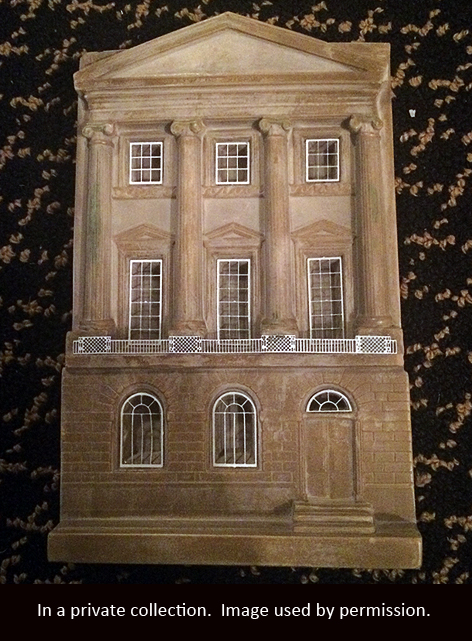
The Entrance Facade from an early 21st century Timothy Richards model
Built / Designed For: Thomas Anson
House & Family History: Lichfield House is a three-bay temple-fronted house designed by James Athenian Stuart, which, not surprisingly, considering its architect’s name, features many Greek-inspired architectural elements. The rear wing has a side elevation with superimposed quasi-Venetian openings based on the Aqueduct of Hadrian in Athens. Inside, the impressive barrel-vaulted Entrance Hall leads to Samuel Wyatt’s Staircase Hall, with its lovely, glazed dome. Stuart’s gold, blue, and apricot Saloon has an octagonal flat-domed plaster ceiling by Joseph Rose, Jr., (who did much work for Adam), with paintings by Biagio Rebecca (the design for the Saloon was copied almost exactly by Stuart from his earlier Drawing Room at Londonderry House). The Saloon’s grand chimneypiece, featuring a frieze inspired by the Choragic Monument of Lysicrates, was very likely carved by the Flemish sculpture Peter Scheemakers and closely resembles that of the chimneypiece in the Great Room at Spencer House. To top off the “Greekness,” the doorcases of the Saloon features angled, fluted friezes modeled on the Incantada at Salonika. Though they continued to own it, the Anson family ceased to occupy Lichfield House in the early 19th century. Between 1846 and 1850 the House was the home of the Army and Navy Club; in 1851 it hosted an exhibition of paintings as part of the Great Exhibition; and, between 1854 and 1856, Lichfield House was occupied by the Junior United Service Club. In April 1856 the 2nd Earl of Lichfield sold Lichfield House for £12,750 (approximately £8 million in 2016 values, using the labour value commodity index) to the General Medical Society (later the Clerical, Medical and General Life Assurance Society, today known as Clerical Medical, a unit of Lloyds Banking Group); the Society occupied Lichfield House until 1975, when they moved their headquarters to Bristol. During the time of the 1st Earl of Lichfield the House was a center of government, as Lord Lichfield served as postmaster-general, famously introducing penny postage in 1840.
Collections: The contents of Lichfield House were sold in April of 1842.
Architect: Samuel Wyatt
Date: 1791-94House Listed: Grade I
Park Listed: No Park
Past Seat / Home of: Thomas William Anson, 2nd Viscount Anson and 1st Earl of Lichfield, 19th century; Anson family here from 1766 until 1856.
Current Ownership Type: Corporation
Primary Current Ownership Use: Offices
House Open to Public: No
Historic Houses Member: No